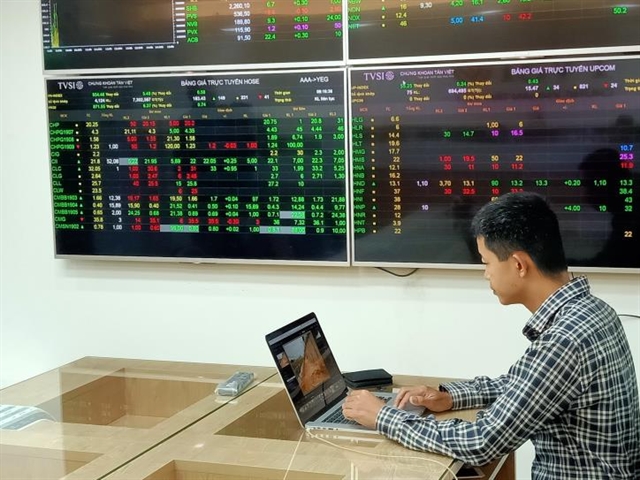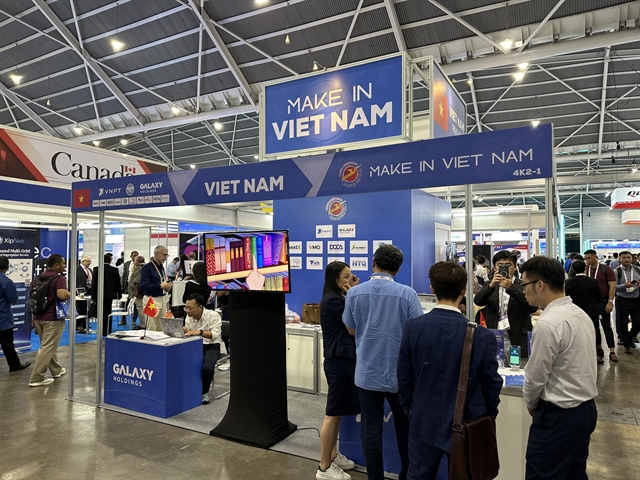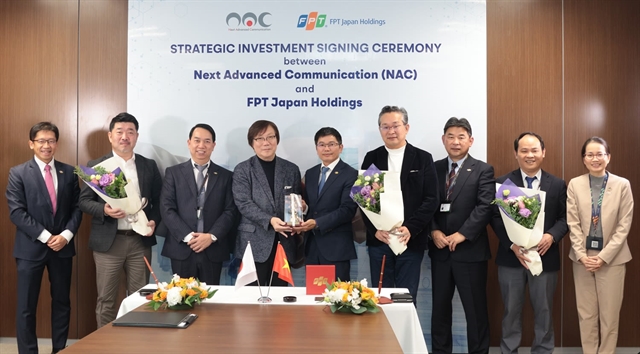 Economy
Economy


|
| Dr. Nguyễn Thanh Tuyên, Deputy Director of the Department of Information Technology and Communications Industry at the Ministry of Information and Communications. — Photos nhandan.vn |
Dr. Nguyễn Thanh Tuyên, Deputy Director of the Department of Information Technology and Communications Industry at the Ministry of Information and Communications, spoke to the Nhân Dân (People) newspaper about market access experiences and helping Vietnamese businesses conquer the most demanding markets.
The task force established by the Ministry of Information and Communications (MoIC) to promote Vietnamese digital technology products globally has significantly enhanced the brand presence of Vietnamese digital technology enterprises worldwide. How do you assess the achievements over the past year?
Prior 2023, MoIC began supporting Vietnamese digital technology enterprises to expand into international markets. Early in 2023, the ministry set up an advisory task force aimed at effectively implementing initiatives to assist these enterprises.
Throughout 2023 and early 2024, the ministry organised seven delegations to major markets such as the United States, Japan, Singapore, Australia, New Zealand and Spain. These trips facilitated connections between sixty Vietnamese businesses and over three thousand international enterprises and organisations across sectors like BPO, ITO, semiconductors, autonomous vehicles and Fintech. They also arranged more than 100 business-match meetings between Vietnamese and foreign IT firms.
At Asia Tech X Singapore (ATxSG), Asia's largest tech exhibition, held in Singapore in 2023 and 2024, the national pavilion showcasing Vietnamese IT products attracted about 1,800 visitors, leaving a positive impression among international partners.
The ministry also supported Vietnamese enterprises in participating in prestigious international digital technology awards such as the ASEAN Digital Technology Awards (ADA) and the Asia-Pacific ICT Alliance Awards (APICTA). In 2024, Vietnamese enterprises led all ASEAN countries in winning gold and silver medals at ADA.
The ministry collaborated with associations and enterprises to host various trade and investment promotion activities, creating opportunities for Vietnamese businesses to expand globally. They facilitated meetings between Vietnamese software companies and Vietnamese trade counsellors in ten countries, including the US, Germany, France, Japan, South Korea, Singapore, Laos, Cambodia and Taiwan (China), aimed at boosting exports and business growth.
Amid domestic economic challenges and the global IT market's growth potential, these initiatives have significantly bolstered the reputation of Vietnamese products and enterprises internationally, easing market entry for businesses.
Among the many markets where Vietnamese enterprises have established customer bases such as the US, Europe, Japan and Southeast Asia, which market do you believe holds untapped potential for Vietnamese information technology enterprises?
Currently, Việt Nam's key markets include Northeast Asia (Japan, South Korea) and North America (the US, Canada), with potential growth opportunities in Europe and Southeast Asia. Japan stands out as a particularly promising market for Vietnamese digital technology enterprises.
Japan's IT market was valued at US$455 billion in 2023 and is projected to reach $480 billion by 2028. The country faces a significant shortage of IT professionals, exacerbated by its aging population and shifting student interests away from IT towards fields like psychology and sociology.
This shortage has led Japanese companies to increasingly rely on foreign labour, with growing opportunities expected in fields such as finance, banking, public administration, healthcare and retail.
Recently, the Fukuoka prefectural government hosted a seminar on June 5 to attract investment from Vietnamese technology enterprises, reflecting Japan's efforts to welcome more foreign tech firms. Similarly, Kanagawa prefecture, adjacent to Tokyo, aims to leverage Vietnamese enterprise presence to aid Yokohama's digital transformation.
Beyond Japan, there's high demand for Vietnamese digital technology expertise in countries like the US, Singapore, Europe, and the UK, particularly in advanced sectors such as semiconductors and AI.
In 2024, government and business delegations from these nations have visited Hà Nội and MoIC to explore potential collaborations. During a visit to MoIC on June 18, Jason Oxman, President of the Information Technology Industry Council (ITI), expressed the US's desire for Việt Nam to play a crucial role in the global IT supply chain.

|
| Việt Nam's booth at the Asia Tech X Singapore exhibition in 2024. |
Entering the global market, Vietnamese enterprises will have to compete with many giants worldwide. In your opinion, what makes 'Make in Vietnam' digital technology products competitive?
Việt Nam is a well-known provider of offshore software outsourcing services to the global market, ranking sixth in the world and leading in Japan.
Initially focused on supplying human resources and programming on demand, Vietnamese IT enterprises have evolved to offer comprehensive IT consulting and solutions to foreign markets.
Successful penetration into markets like Japan requires understanding clients' needs, possessing core technologies, and building robust ecosystems with branches across the country. Vietnamese tech services span diverse sectors from banking, finance, insurance and logistics to manufacturing, automation and workforce development.
Recently, Vietnamese tech firms have expanded into new sectors such as logistics, healthcare, telecommunications, energy, digital transformation, hospitality, entertainment and e-commerce. They are adopting key digital technologies including 5G, IoT, AI, robotics, virtual reality, big data and cloud computing.
At the Asian Technology Exhibitions in Singapore in June 2023 and May 2024, Vietnamese enterprises showcased over eighty products based on cutting-edge technologies. These include VinBrain's AI cancer diagnosis, VNPT's IoT security and smart home solutions, Rạng Đông's smart lighting, HANET's smart cameras, EVN's smart electric meters and charging stations, VTI's Flyer AI, NTQ's AI object verification and character simulation tech, Smartlog's supply chain solutions and Sconnect's animation technology.
Some Vietnamese IT enterprises have successfully leveraged their G7 market experience to expand into other international markets, achieving notable success.
How is the database tracking Việt Nam's exports of digital products being developed?
The Department of Information Technology and Communications Industry has established and maintains a database of digital technology enterprises, encompassing data on revenue, exports, products and the work force.
According to information from this database, in 2023, the export revenue from software and IT services by Vietnamese enterprises (excluding FDI enterprises) amounted to approximately US$9 billion, representing 6.3 per cent of the total industry revenue of US$142 billion.
Over 1,500 Vietnamese digital technology enterprises are actively operating in foreign markets. Key players include Viettel, VNPT, FPT, CMC, TMA, NTQ Solution, Rikkei Soft, VMO Holdings, VNG and MOR Software.
In addition to many enterprises establishing their presence in the global market, there are also numerous young enterprises striving to introduce Vietnamese technology products worldwide. What lessons can these young companies learn to avoid stumbling in their initial steps?
During Vietnam Information Technology Week in Japan, organised by VINASA in May 2023, successful enterprises like FPT Japan, NTQ Japan, VMO Japan and Rikkeisoft showcased their strategies.
They focused on centralising in Tokyo's core areas, hiring locals for navigating Japan's complex market. Direct outreach to high-level leaders has replaced scattergun approaches, enhancing client engagement.
These companies are adapting to recent Japanese government policies that favour using local resources over outsourcing tasks abroad.

|
| FPT acquires the IT services company Next Advanced Communications NAC Co., Ltd. (NAC), making it FPT’s first merger & acquisition (M&A) deal in Japan. |
Việt Nam has witnessed numerous enterprises establishing themselves in several major global markets, but many have also encountered setbacks. What challenges do Vietnamese information technology companies currently face?
Vietnamese enterprises face several challenges.
The digital technology sector in Việt Nam lacks widespread awareness and state support, despite its significant revenue and export volumes surpassing traditional sectors like rice.
Annual state funding for enterprise commercial promotion is minimal, around VNĐ2.5 billion per year, limiting the impact of initiatives like the Trade Promotion Programme.
At events like ATxSG 2024, 'Make in Vietnam' booths are relatively modest due to funding constraints compared to regional competitors like Singapore, China, and South Korea.
While software and IT services thrive, hardware products struggle to gain international recognition beyond those from foreign-invested enterprises.
Việt Nam's IT workforce faces challenges in quality and readiness, with about 30 per cent of graduates meeting market demands and a lack of proficiency in foreign languages and soft skills.
There's a need for a more integrated ecosystem of digital technology enterprises to support Việt Nam's international ventures.
You mentioned the necessity of establishing a Vietnamese business ecosystem to support global market ventures. How do you propose to implement this solution?
It's crucial to build a strong Vietnamese business ecosystem capable of handling major international IT projects. Vietnamese IT firms should collaborate locally and globally to strengthen their sales capabilities and innovate in new products, essential for competing on the global stage. Enhancing media support is also vital to inform Vietnamese enterprises about promising foreign markets, encouraging them to expand abroad.
Supporting Vietnamese IT enterprises in organising trade promotions, business matching and international exhibitions will boost their visibility and global reach. Additionally, improving IT education at universities and vocational schools to meet international standards in technology and language skills is crucial.
Alongside promoting 'Make in Vietnam' focusing on products and services made here for the global market, Việt Nam needs a comprehensive global marketing strategy, branded 'Made by Vietnam' to effectively promote and support its IT enterprises worldwide. This strategy should embrace products, solutions, and services from Vietnamese enterprises operating globally, not just in Việt Nam.
How will the task force promoting Vietnamese digital technology products continue to support Vietnamese enterprises in expanding into foreign markets?
There's much to be done.
MoIC plans to support Vietnamese digital technology firms entering foreign markets. They'll collaborate with the Ministries of Foreign Affairs and Industry and Trade to create channels and aid for firms in key markets like the US, Europe, Japan and South Korea.
They'll also enhance surveys on Vietnamese firms abroad, build a database for cooperation, and gather market info for strategies. They'll continue organising delegations and participating in global trade events to promote ICT products.
Strengthening media and branding efforts will further boost Vietnamese IT firms' global profile. — VNS